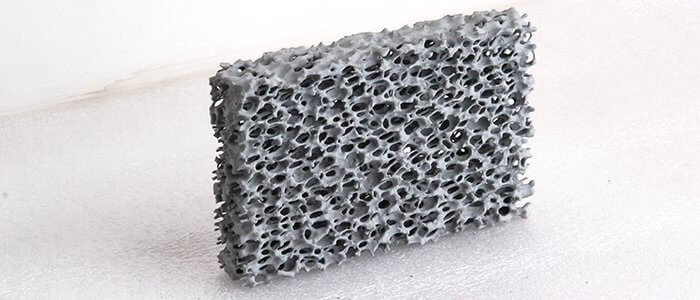Ceramic filtration systems are an essential component of modern industries such as metal casting, foundry, and the chemical process. One critical part of the ceramic filtration system is the silicon carbide ceramic foam filter, which serves as the primary means of filtering out impurities and ensuring a homogenous melt.
However, the type of iron used in the casting process can have a significant impact on the performance and effectiveness of ceramic filtration systems. In this article, we will discuss the differences in the use of ductile iron and gray iron for silicon carbide ceramic foam filters.

Ductile Iron (DI) and Gray Iron (GI)
Ductile iron and gray iron are two of the most commonly used iron alloys in the casting industry. Ductile iron is also known as nodular cast iron, while gray iron is also called grey cast iron.
Ductile iron is a modern, versatile, and cost-effective iron alloy that offers superior strength, toughness, and ductility than gray iron. It is produced by adding trace amounts of magnesium to molten iron, which turns the graphite into nodular, or spherical, shape. This unique structure gives the ductile iron excellent mechanical properties, making it ideal for use in many industrial applications.
Gray iron, on the other hand, is a brittle and inflexible iron alloy that is easily fractured and lacks the ductility that ductile iron exhibits. It is produced by adding carbon to molten iron, which causes the graphite to form flakes instead of spheres. While gray iron is cheaper than ductile iron, it is less flexible, and its mechanical properties are unsuitable for many applications.
Differences in the Use of Ductile Iron and Gray Iron for Silicon Carbide Ceramic Foam Filters
The choice of iron alloy for the casting process can have a significant impact on the performance of the ceramic filtration system. Silicon Carbide Ceramic Foam Filters are used in the casting process to remove impurities from the melt, ensuring a homogenous mixture. But, which of the two iron alloys is better suited for this purpose?
Ductile iron is superior to gray iron in most aspects, including its mechanical properties, and that also applies to the use of silicon carbide ceramic foam filters. Ductile iron’s superior strength and ductility allow it to withstand the high pressure and temperature generated by the ceramic filter more effectively.
In contrast, gray iron’s brittle nature makes it more susceptible to fractures when subjected to high pressure and temperature. This can lead to the failure of the filter, resulting in poor filtration and a less-controlled casting process.
Another critical advantage of ductile iron is its corrosion resistance, which helps reduce wear and tear on the silicon carbide ceramic foam filter and prolong its service life. Gray iron, on the other hand, is highly susceptible to corrosion, which can lead to accelerated deterioration of the filter, and, ultimately, failure.
Conclusion
In conclusion, the choice of iron alloy used in the casting process is essential to ensure the efficient and effective performance of ceramic filtration systems. Ductile iron is the preferred choice for silicon carbide ceramic foam filters due to its superior mechanical properties, including strength, ductility, and corrosion resistance.
Gray iron, while a cheaper alternative, lacks the mechanical properties required for most industrial applications, including the use of ceramic filtration systems. Therefore, it is crucial to consider the properties of the iron alloy before choosing the type of filter used in the casting process.


